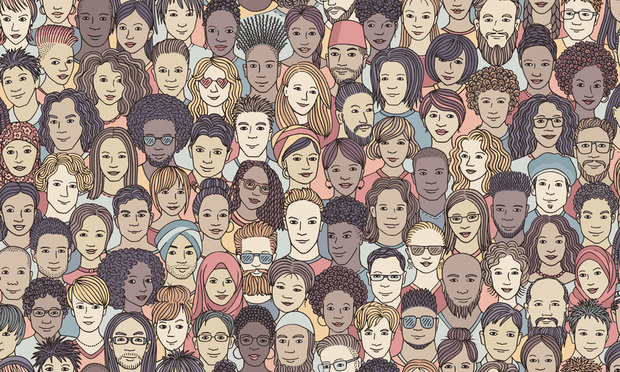Readers Say Their Firms Take Diversity Seriously, But Some Doubt Its Effectiveness
In a recent survey of Texas lawyers, we asked readers about the state of diversity across law firms and other legal organizations in Texas.
April 12, 2019 at 10:56 AM
6 minute read
 Illustration of a diverse group of people.
Illustration of a diverse group of people.
In a recent online survey, we asked Texas Lawyer readers about the state of diversity in law firms and other legal organizations across the state.
Respondents for the most part said that diversity is a priority in their workplace, and not in a way that is just window dressing. A majority of respondents said that diversity is not considered when it comes time for promotions. The specific data from across Connecticut, Florida, Pennsylvania and Texas are below.
The numbers weren't as revealing as the short answer responses from readers. Despite reporting that firms seriously pursue diversity, some readers were skeptical of diversity's effectiveness in producing a productive and profitable working environment. Comments also warned about the dangers of engaging in what one reader described as “reverse racism” by focusing on diversity initiatives. Some of those responses included:
Response 1: No initiatives seem to work. We hire exclusively from the top part of the class at UT Law (top 5% w/o law review; top 10% w/ law review. We never see non-Asian minorities with these qualifications. If we decided to make exceptions, we would be creating a firm in which we have two different classes of lawyers. That seems unwise in the extreme.
Response 2: Acquire professional coaching for the diverse AND their older majority population superiors to help them bridge the diversity divide, build relationships, and develop the welcoming culture without which the diverse will never advance.
Response 3: Looking at all qualified candidates and not limiting ourselves to hiring white males.
Response 4: Focusing on merit rather than filling quotas. everyone is happier. no one wants to promote subpar attorneys more than they have to. focusing on merit rather than diversity keeps everyone happier.
Response 5: Diversity merely for the sake of diversity is a disservice to everyone.
Ambivalence about diversity aside, legal clients say they are interested in working with a diverse set of attorneys and are increasingly putting pressure on firms to meet those expectations.
Jennifer Reddien, director of diversity and inclusion at Haynes and Boone in Dallas, explained diversity and inclusion initiatives at firms and how they contribute to the bottom line. The following excerpts are taken from an interview with her and edited for length and clarity:
“The conversation is a lot more present and a lot more open. People are taking a stand now and realizing that it is important to clients,” Reddien said. “It really does matter to them and not just because they want a diverse group of people, it's that it's been proven that diverse groups often come up with better financial outcomes.”
How a diverse team benefits outcomes >> Reddien: “I think it's having diverse perspectives. Whether it's geographic diversity, or gender, or whatever kind of diversity you might think of–people come from different places and different backgrounds, and so they may look at issues in a different way than someone who came from a different background than they did. … So you get all these perspectives together at once and you just have a lot more creativity than if you just have people of the same background in a room who may think the same way.
The importance of “inclusion” initiatives >> Reddien: “Say you're in a group and it's a diverse group, you want them to feel included and that their opinions are valued, too. What's the point of having diverse thought if you're not going to include what that person has to say?”
“You have someone who may come from a different background, but they're included in the group, and they're asked to give their opinions.”
“We include allies with everything we do. … for instance, we have a working parents subcommittee. You don't have to be a parent to be in that group. If you're an ally and you support working parents, we want you to come and be a part of that group as well.”
“I also think with the inclusion piece there's a huge part of it that's not maybe formal, but taking people to lunch for instance, or asking someone to go play golf. Things like that are a little bit more informal ways to help people feel included. Things that happen outside the firm as well as inside the firm. There are things we can do formally, but there are also informally things that can be done–people can be educated on those things that they might not otherwise think about.”
On recruiting diverse candidates >> Reddien: “We've focused very much on recruiting. And we've been able to hire very talented and very qualified minor candidates.”
“We have an excellent summer program, a diversity scholars program that we offer that is very attractive to law students.” “I think it's about attraction. It's also about seeking out candidates, finding candidates who fit into Haynes and Boone culture. We are very targeted with our selections. We want people who are going to thrive here and who will really benefit from the culture. We describe it as a very collaborative environment.”
“There are a lot of qualified minority candidates out there. It's not just something our firm can achieve. Other firms can achieve that as well.”
Final thoughts >> Reddien: “Another example that I think is key too is if you go to a meeting where you see someone new or someone who might look a little out of place, you can go up to that person and ask them to sit next to you at the meeting. Little gestures like that help quite a bit.”
This content has been archived. It is available through our partners, LexisNexis® and Bloomberg Law.
To view this content, please continue to their sites.
Not a Lexis Subscriber?
Subscribe Now
Not a Bloomberg Law Subscriber?
Subscribe Now
NOT FOR REPRINT
© 2025 ALM Global, LLC, All Rights Reserved. Request academic re-use from www.copyright.com. All other uses, submit a request to [email protected]. For more information visit Asset & Logo Licensing.
You Might Like
View All
2023 Go-To Law Schools: For Judicial Clerkships, Government and Public Interest Jobs, Small Schools Reign
6 minute read
Security and Overreliance: Attorney Addresses Generative AI Concerns for Legal Industry
1 minute read
Mental Health by the Numbers: An Infographic Mapping the Legal Industry's Well-Being
1 minute readTrending Stories
- 1'It's Not Going to Be Pretty': PayPal, Capital One Face Novel Class Actions Over 'Poaching' Commissions Owed Influencers
- 211th Circuit Rejects Trump's Emergency Request as DOJ Prepares to Release Special Counsel's Final Report
- 3Supreme Court Takes Up Challenge to ACA Task Force
- 4'Tragedy of Unspeakable Proportions:' Could Edison, DWP, Face Lawsuits Over LA Wildfires?
- 5Meta Pulls Plug on DEI Programs
Who Got The Work
Michael G. Bongiorno, Andrew Scott Dulberg and Elizabeth E. Driscoll from Wilmer Cutler Pickering Hale and Dorr have stepped in to represent Symbotic Inc., an A.I.-enabled technology platform that focuses on increasing supply chain efficiency, and other defendants in a pending shareholder derivative lawsuit. The case, filed Oct. 2 in Massachusetts District Court by the Brown Law Firm on behalf of Stephen Austen, accuses certain officers and directors of misleading investors in regard to Symbotic's potential for margin growth by failing to disclose that the company was not equipped to timely deploy its systems or manage expenses through project delays. The case, assigned to U.S. District Judge Nathaniel M. Gorton, is 1:24-cv-12522, Austen v. Cohen et al.
Who Got The Work
Edmund Polubinski and Marie Killmond of Davis Polk & Wardwell have entered appearances for data platform software development company MongoDB and other defendants in a pending shareholder derivative lawsuit. The action, filed Oct. 7 in New York Southern District Court by the Brown Law Firm, accuses the company's directors and/or officers of falsely expressing confidence in the company’s restructuring of its sales incentive plan and downplaying the severity of decreases in its upfront commitments. The case is 1:24-cv-07594, Roy v. Ittycheria et al.
Who Got The Work
Amy O. Bruchs and Kurt F. Ellison of Michael Best & Friedrich have entered appearances for Epic Systems Corp. in a pending employment discrimination lawsuit. The suit was filed Sept. 7 in Wisconsin Western District Court by Levine Eisberner LLC and Siri & Glimstad on behalf of a project manager who claims that he was wrongfully terminated after applying for a religious exemption to the defendant's COVID-19 vaccine mandate. The case, assigned to U.S. Magistrate Judge Anita Marie Boor, is 3:24-cv-00630, Secker, Nathan v. Epic Systems Corporation.
Who Got The Work
David X. Sullivan, Thomas J. Finn and Gregory A. Hall from McCarter & English have entered appearances for Sunrun Installation Services in a pending civil rights lawsuit. The complaint was filed Sept. 4 in Connecticut District Court by attorney Robert M. Berke on behalf of former employee George Edward Steins, who was arrested and charged with employing an unregistered home improvement salesperson. The complaint alleges that had Sunrun informed the Connecticut Department of Consumer Protection that the plaintiff's employment had ended in 2017 and that he no longer held Sunrun's home improvement contractor license, he would not have been hit with charges, which were dismissed in May 2024. The case, assigned to U.S. District Judge Jeffrey A. Meyer, is 3:24-cv-01423, Steins v. Sunrun, Inc. et al.
Who Got The Work
Greenberg Traurig shareholder Joshua L. Raskin has entered an appearance for boohoo.com UK Ltd. in a pending patent infringement lawsuit. The suit, filed Sept. 3 in Texas Eastern District Court by Rozier Hardt McDonough on behalf of Alto Dynamics, asserts five patents related to an online shopping platform. The case, assigned to U.S. District Judge Rodney Gilstrap, is 2:24-cv-00719, Alto Dynamics, LLC v. boohoo.com UK Limited.
Featured Firms
Law Offices of Gary Martin Hays & Associates, P.C.
(470) 294-1674
Law Offices of Mark E. Salomone
(857) 444-6468
Smith & Hassler
(713) 739-1250







